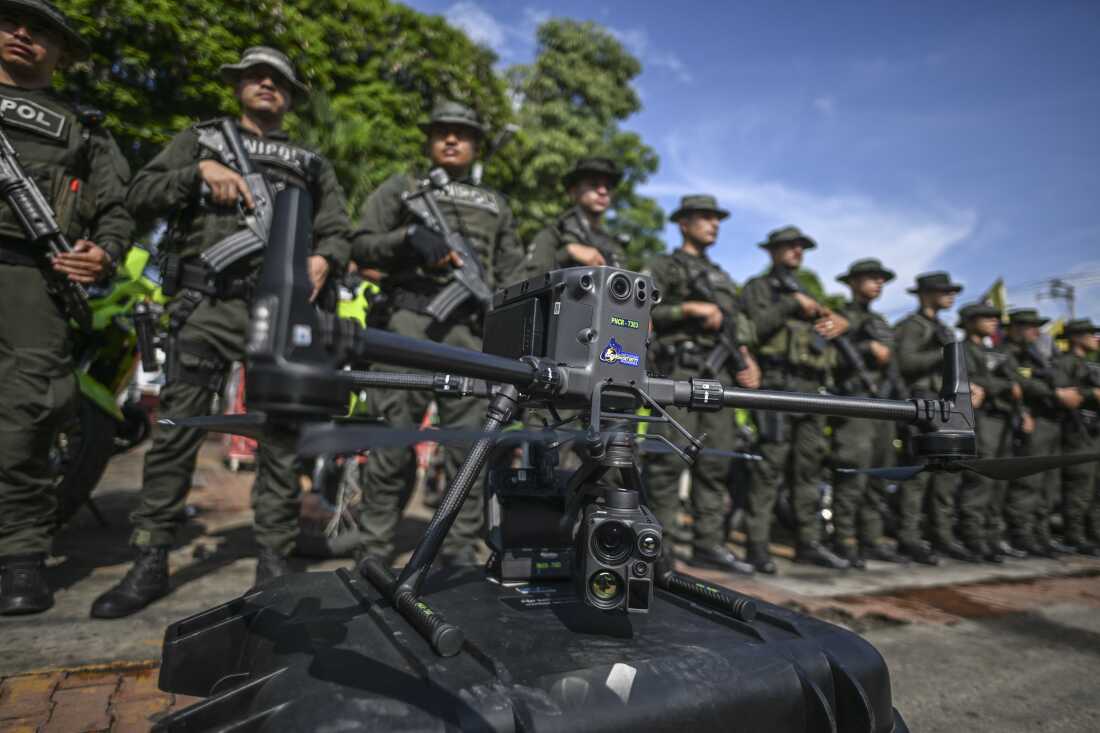
Police officers stand in formation behind a drone that will be used to increase the security in Jamundi, Valle del Cauca province, Colombia, on June 13, 2024. JOAQUIN SARMIENTO/AFP via Getty Images hide caption
toggle caption
JOAQUIN SARMIENTO/AFP via Getty Images
BOGOTÁ, Colombia – Inside a cavernous hangar next to Bogotá’s international airport, military officers are testing a new weapon: a Colombian-made drone that can carry up to 18 pounds of explosives.
“It’s a tactical drone that’s easy for troops to carry but one that also has a lot of firepower,” says Colombian Air Force Col. Andrés Talavera, who is overseeing the test flight.
The drone is the latest salvo in the government’s battle against guerrillas and drug-traffickers. But although unmanned aerial vehicles have become vital weapons in conflicts from Ukraine to the Middle East, Colombia is a late comer to drone warfare.
Colombia’s conflict has been going on since the 1960s but the violence had been decreasing in recent years. That was due to a 2016 peace treaty that disarmed the country’s largest guerrilla army as well as ceasefires with smaller criminal groups.
But over the past year, those ceasefires have collapsed.
Now, says Army Gen. Juan Carlos Correa, the criminals are using drones to monitor their drug crops and cocaine laboratories, target rival smugglers, and ambush police and army troops. Over the past two years, these groups have successfully attacked security forces about 200 times with explosive-laden drones.
“In one single day they launched 17 attacks,” Correa told NPR.
The technology is inexpensive and widely available. The drug traffickers buy commercial drones online for a thousand dollars or so, then attach homemade explosives to them.
Air Force Gen. Andrés Guzmán, who heads CIAC, the state-run company producing Colombia’s military drones, says that because the new technology is so cheap, it has provided a huge boost for criminal groups.
“The conflict will always be a David vs. Goliath situation but a drone can be the perfect solution for these groups when they are confronting the military, which has a lot more technology,” he told NPR.
But as often happens with unconventional weapons, civilians are ending up in harm’s way. Drones jury-rigged by criminals have damaged homes and and killed children.
“The grenades are hand-made by them,” Gen. Correa said. “The targeting system is not very precise. There was a 10-year-old kid who was killed by one of these grenades in the middle of a town.”
Still, the criminals are improving their aim. Over the past two years, about 60 army troops have been wounded in drone attacks while four have been killed. The latest was 20-year-old Edison Guerrero, an army solider who was killed in May while on patrol near the Venezuelan border.
Guerrero’s death was another blow to his family, which had been uprooted and forced to move by the fighting. Reached on the phone, Noralba Rodríguez, the soldier’s grieving sister, told NPR: “This war doesn’t make any sense.”
To defend themselves, soldiers will often start firing wildly at incoming drones. But that rarely works because the devices are so small and maneuverable. Col. Talavera said that the only effective defense is an anti-drone system made up of radars and jammers that block the frequency of enemy drones.
But it’s expensive. Col. Talavera said the electronics to take down a $2,000 drone can cost up to $15,000. What’s more, the drones drug gangs are buying from online retailers are improving at a much faster clip than the military’s technology to combat them.
Laura Bonilla, deputy director of the Peace and Reconciliation Foundation, a Bogotá think tank, says excessive government red tape for purchasing and flying drones has hamstrung the military.
“There is too much bureaucracy. So, it’s really difficult for the armed forces to reach the same capacity” as drug trafficking groups, she said. “The criminals don’t need any permits.”
To keep from falling farther behind – and from having to rely on foreign suppliers – the Colombian government has been manufacturing its own drones. But it’s slow-going. While cash-rich drug traffickers can buy dozens of drones with a few clicks on a computer, Colombia’s military is turning out just eight of its latest models of drone per month.
When it comes to Colombia’s drone war, Bonilla says, “the criminals have the strategic advantage.”












